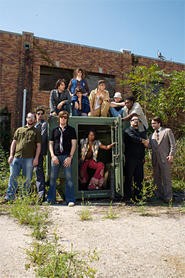Security marks a number of important firsts for the band. It's their first album for the Epitaph imprint Anti- and a symbol of how constant touring and energetic shows have built a loyal and large grassroots audience over the last nine years. It's their first album with an outside producer, Tortoise's John McEntire (Stereolab, Trans Am), who helped create a truly studio-friendly release. And it's also the first album to step outside the constraints of the afrobeat sound, embracing a wider variety of tones and moods.
But these successes obscure a larger truth.
Aside from promoting a number of unusual acts who have been able to break into the mainstream without major radio play (thanks either to NPR, in the case of Norah Jones, or movies for artists such as Buena Vista Social Club and Gillian Welch), the music industry is pretty risk-aversive at the moment. It's a factor actively working against Antibalas in a number of ways. Not only is the band three times the size of your average outfit, but they're playing afrobeat, a heavily rhythmic, Africanized version of jazz and funk that American ears often confuse with totally unrelated genres.
"[Few] hear where our true influences are, other than 'They remind me of Santana and Ozomatli' -- basically a multicultural group with horns," says group founder and saxophonist Martin Perna, who's loaded into one of the band's two vans on their way to Louisville, Kentucky for a show. "If you look at what we listen to and what our actual musical jump-off points are, it's not that at all. It's Fela Kuti, James Brown, Sun Ra, and Eddie Palmieri."
The biggest inspiration of all is Nigerian musician Fela Kuti, who led an enormously influential African group that created a provocative sociopolitical sound, rivaling Bob Marley's for worldwide influence. Beaten, jailed, and constantly harassed by his government, Kuti became a folk hero throughout Africa beginning in the early '70s. And after his death in 1997, Perna felt compelled to continue his legacy. He felt there was a power to unify in Kuti's music, so he started Antibalas (Spanish for "bulletproof") as an American afrobeat beachhead. The band began in a grungy loft he shared with TV on the Radio singer Tunde Adebimpe and Gabriel Roth, who helped form funk revivalists Sharon Jones & the Dap-Kings.
Antibalas carried on the traditions of the music: repetitive, horn-driven grooves bolstered by lots of percussion, call-and-response choruses, and a frenetic energy. "It's sweaty, sensual, angry, hopeful, joyful -- all at the same time," explains Perna. Furthermore, it's a live music much like jazz: fueled by improvisation and the enthusiasm of the audience. Hand signals and the big trombone of conductor Aaron Johnson cue the 12-person ensemble to the moves, and the music swells with the room's spirit.
But like many bands that excel in the live setting, Antibalas has experienced problems when translating their performances to disc. That began to change with 2004's Who Is This America, where the band did more than just "take the songs into the studio and hit record." For the first time, Perna and gang embraced the possibility of overdubs, which helped flesh out their sound. Additionally, keyboardist Victor Axelrod, responsible for the Floyd-meets-reggae platter Dub Side of the Moon disc, began taking a more active role, creating weird, dubbed-out echo and transitions between songs.
But Security goes even further, reflecting a whole new attitude on the part of the band. "[Prior to the latest album] the general feeling of the group -- not that everybody felt that way -- but the dominant feeling of the group was still much less prone to take risks and less willing to step out of more traditional sounds," admits Perna.
This is where McEntire entered the picture. Besides engineering and production duties, he helped mediate group discussions and contributed additional studio insight, helping put his own stamp on the album. The result is the warmest, smoothest, most accessible release of Antibalas' career. Stepping out of afrobeat's confines to embrace jazzier, less rhythmically dominated numbers, the group has created an identity of their own -- outside that "Afrobeat Orchestra" thing.
At the same time, the different sound wasn't "something we really discussed," says Perna. "We took it on a song-by-song basis and put a tremendous amount of trust in John McEntire to interpret our music and shape them in an effective way in the mix. With so many members and shared leadership, issues of identity always come up, but it keeps the group in a good dynamic tension. More people are composing, which gives us a deeper pool of songs to choose from and broadens our aesthetic."
Perna also points to the continuing war in Iraq and the aftermath of Hurricane Katrina as important influences on Security's more reflective tracks, including "Age," "I.C.E.," and "Sanctuary." "I think, as a country, we're at a point where we really need to take stock of everything and see the direction we're heading, and think about putting on the brakes instead of stepping on the gas."
It's a fine sentiment, coming from a political, boundary-pushing act. And as Antibalas has demonstrated with its music, change is accomplished not only through frenetic energy and fiery rhetoric, but also with a measured, well-considered patience.


